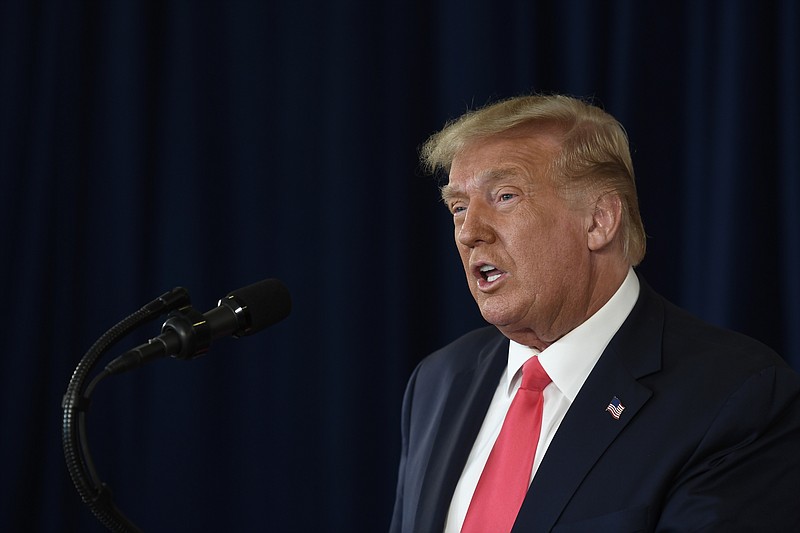BEDMINSTER, N.J. (AP) - Seizing the power of his podium and his pen, President Donald Trump on Saturday bypassed the nation's lawmakers as he claimed the authority to defer payroll taxes and replace an expired unemployment benefit with a lower amount after negotiations with Congress on a new coronavirus rescue package collapsed.
At his private country club in Bedminster, New Jersey, Trump signed executive orders to act where Congress hasn't.
Trump moved to continue paying a supplemental federal unemployment benefit for millions of Americans out of work during the outbreak. However, his order called for up to $400 payments each week, one-third less than the $600 people had been receiving. How many people would receive the benefit and how long it might take to arrive were open questions.
Congress had allowed the higher payments to lapse Aug. 1, and negotiations to extend them were mired in partisan gridlock, with the White House and Democrats miles apart.
The Democratic congressional leaders Trump criticized ahead of signing the orders, House Speaker Nancy Pelosi and Senate Minority Leader Chuck Schumer, dismissed Trump's actions as "meager" in the face of economic and health crises facing Americans. Trump's Democratic opponent in the presidential race, Joe Biden, said the president had issued "a series of half-baked measures" and accused him of putting Social Security at risk.
The executive orders could face legal challenges questioning the president's authority to spend taxpayer dollars without the express approval of Congress. Trump had largely stayed on the sidelines during the administration's negotiations with congressional leaders, leaving the talks on his side to chief of staff Mark Meadows and Treasury Secretary Steven Mnuchin.
In addition to the $400 weekly assistance, Trump's order defers payroll tax and federal student loan payments and continues a freeze on some evictions during the crisis.
"It's $400 a week, and we're doing it without the Democrats," Trump said, asking states to cover 25 percent of the cost. Trump is seeking to set aside $44 billion in previously approved disaster aid to help states maintain supplemental pandemic jobless benefits, but Trump said it would be up to states to determine how much, if any of it, to fund, so the benefits could be smaller still.
Many states already faced budget shortfalls due to the coronavirus pandemic and would have difficulty assuming the new obligation. The previous unemployment benefit was fully funded by Washington.
Democrats had said they would lower their spending demands from $3.4 trillion to $2 trillion but said the White House needed to increase its offer. Republicans had proposed a $1 trillion plan.
White House aides watched the talks break down with apprehension, fearful that failure to close a deal could further damage an economic recovery already showing signs of slowing down. Friday's jobs report, though it beat expectations, was smaller than the past two months, in part because a resurgence of the virus led to states rolling back their reopenings.
The president's team believes the economy needs to stabilize and show signs of growth for him to have any chance at winning re-election. Aides were hoping to frame the executive orders as a sign that Trump was taking action in a time of crisis. But it also would reinforce the view that the president, who took office declaring he was a dealmaker, was unable to steer the process to an agreement.
Trump said Saturday the orders "will take care of pretty much this entire situation, as we know it." But they are far smaller in scope than congressional legislation, and even aides acknowledged they didn't meet all needs.
"This is not a perfect answer - we'll be the first ones to say that," Meadows said Friday as talks broke down and executive orders seemed a certainty. "It's all that we can do and all the president can do within the confines of his executive power."
Trump said the employee portion of the payroll tax would be deferred from Aug. 1 through the end of the year. The move would not directly aid unemployed workers, who do not pay the tax when they are jobless, and employees would need to repay the federal government eventually without an act of Congress.
In essence, the deferral is an interest-free loan that would have to be repaid. Trump said he'll try to get lawmakers to extend it, and the timing would line up with a post-election session in which Congress will try to pass government funding bills.
"If I win, I may extend and terminate," Trump said, repeating a longtime goal but remaining silent on how he'd fund the Medicare and Social Security benefits the 7 percent tax on employee income covers. Employers also pay 7.65 percent of their payrolls into the funds.
Senate Majority Leader Mitch McConnell, R-Ky., issued a statement saying he supported Trump "exploring his options to get unemployment benefits and other relief to the people who need them the most." Like Trump, McConnell accused Democrats of using the coronavirus package negotiations to pursue other goals.
Democrats said they were not favorably impressed by Trump's orders. In a joint statement, Pelosi and Schumer said "these policy announcements provide little real help to families." They added: "Democrats repeat our call to Republicans to return to the table, meet us halfway and work together to deliver immediate relief to the American people. Lives are being lost, and time is of the essence."

